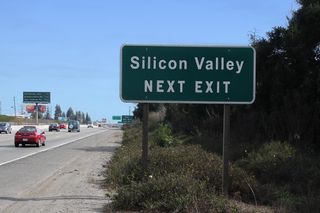Can Silicon Roundabout ever top Silicon Valley?
With a Government push to create our own tech hub in the centre of London, Jennifer Scott looks at why Silicon Valley is such a success and what lessons the UK can learn from the hotbed of innovation in the heart of California.

Silicon Valley resides in California, just south of San Francisco. It isn't just one location but a sprawl of towns and industrial parks built up around the biggest names in technology.
The sun beats down as developers beaver away creating new designs for software and hardware, from phone applications to processors, all within spitting distance of their nearest rivals.
But why have the big guns, such as Google, Intel and Microsoft, shacked up alongside the start-ups? What is it about Silicon Valley that tempts people in and often keeps them here for life?
To make the big bucks, you need a big idea. But to turn that big idea into big bucks, you need investment.
Education, Education, Education
Stanford University. Every tech start-up, industry heavyweight or analyst IT PRO spoke to all mentioned the importance of this academic institution, along with the huge number of educational establishments across the Valley.
Kieran Harty, chief executive (CEO) of virtual storage start-up Tintri, said the first factor to thank for "the explosion of technological innovation in and around Silicon Valley" was "the presence of strong universities and corresponding access to emerging talent."
Get the ITPro. daily newsletter
Receive our latest news, industry updates, featured resources and more. Sign up today to receive our FREE report on AI cyber crime & security - newly updated for 2024.
This is the key. Students are coming up with great ideas and being encouraged to think big and companies already in existence also benefit from a pool of clever technical graduates on their doorstep.
"[There are] previously successful entrepreneurs and executives who are willing to invest in young kids with ideas and technical talent [in Silicon Valley]," added Rich Skrenta, CEO of new search engine Blekko.
Show me the money
To make the big bucks, you need a big idea. But to turn that big idea into big bucks, you need investment.
In Silicon Valley there is unmatched access to this cash through the number of venture capitalists (VCs) keeping their eyes, ears and cheque books on the lookout for the next Google or Facebook.
"VCs [are] willing to take extraordinary risks based on sci-fi forward-looking views of the potential of technology," added Skrenta.
It may still take some fight to secure your rounds of funding but there are so many VCs across the area, someone is likely to listen.
Even during the recession, Silicon Valley seemed relatively unaffected, with new ideas still thriving and new start-ups still getting backing.
"Compared to the rest of the US, Silicon Valley was deeply affected by the recession for less than a year," added Harty. "Budgets were noticeably tighter for a time particularly Q4 2008 but things turned around quickly."
"Silicon Valley's [VCs] were largely insulated from the credit issues that caused the overall economy to freeze. VCs are always searching for new investment opportunities and the recession mostly increased the focus on the best opportunities."
Simon Robinson, research director of storage at The 451, claimed the recession would have made an impact but Silicon Valley "managed to cope with the downturn fairly well."
"Part of the reason is that it learned the lessons from the dot com recession in the early 2000s, which had a devastating impact," he said.
So, come rain or shine, the cash always seems to be available.
Jennifer Scott is a former freelance journalist and currently political reporter for Sky News. She has a varied writing history, having started her career at Dennis Publishing, working in various roles across its business technology titles, including ITPro. Jennifer has specialised in a number of areas over the years and has produced a wealth of content for ITPro, focusing largely on data storage, networking, cloud computing, and telecommunications.
Most recently Jennifer has turned her skills to the political sphere and broadcast journalism, where she has worked for the BBC as a political reporter, before moving to Sky News.





